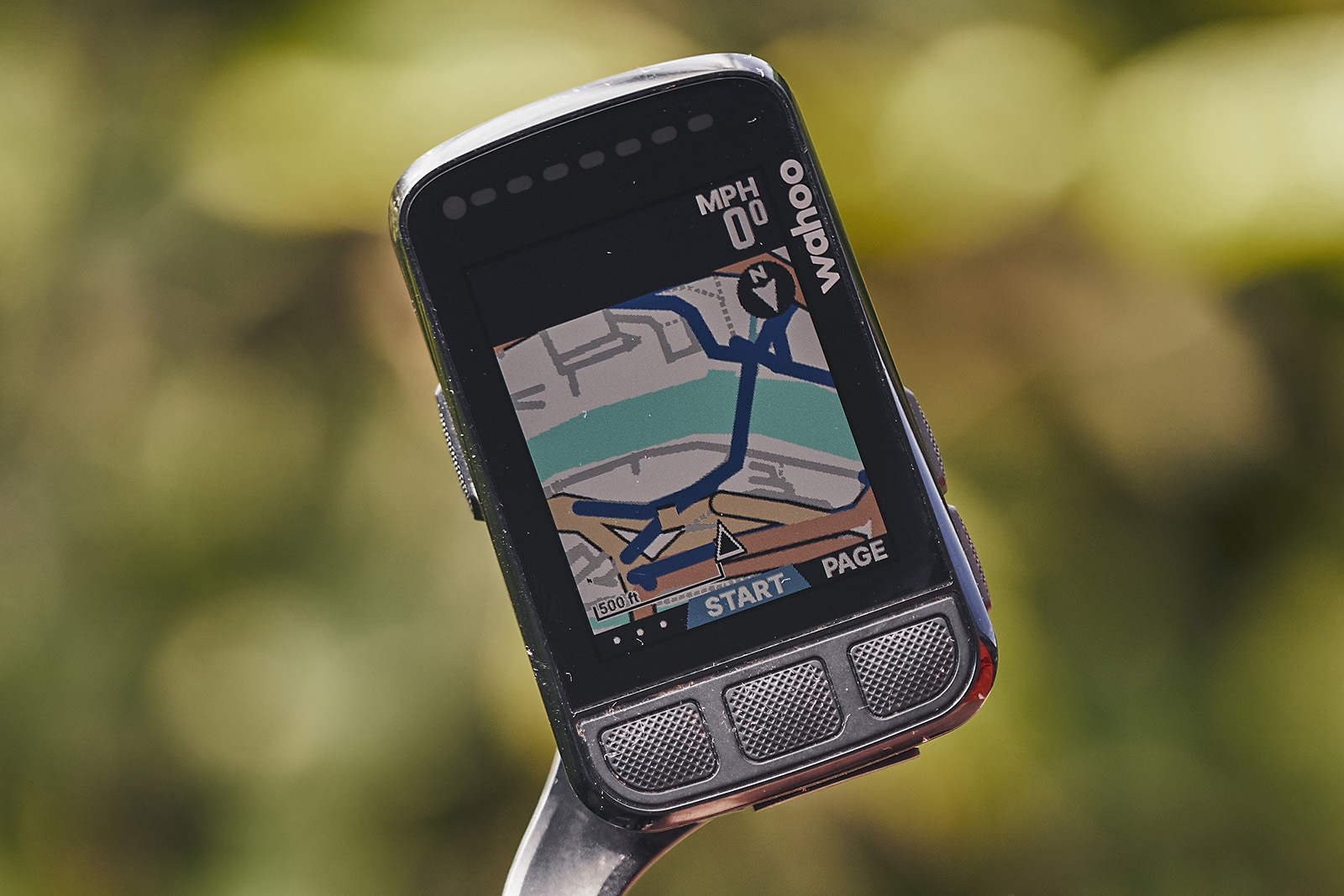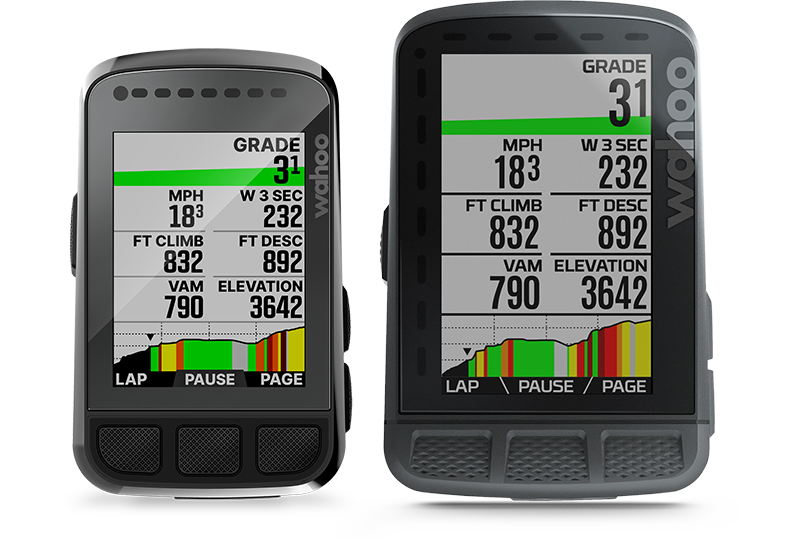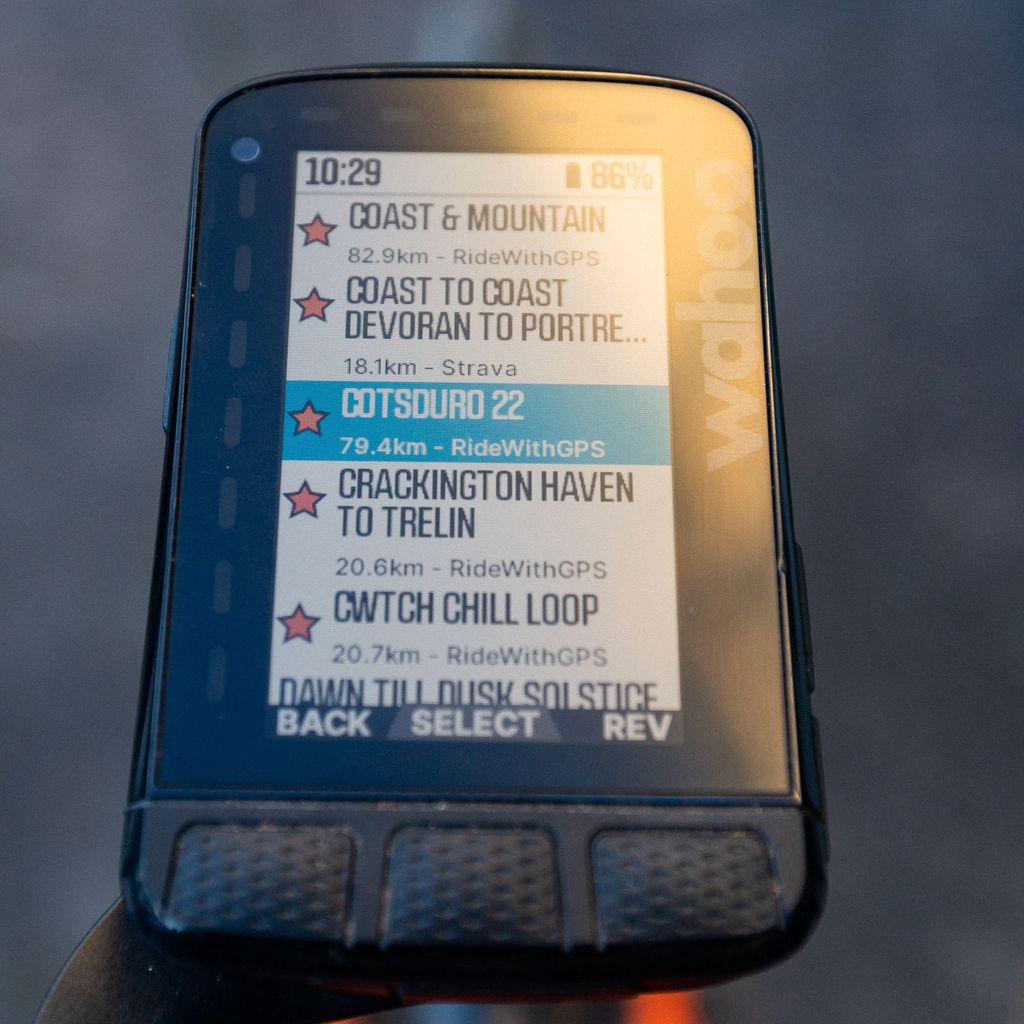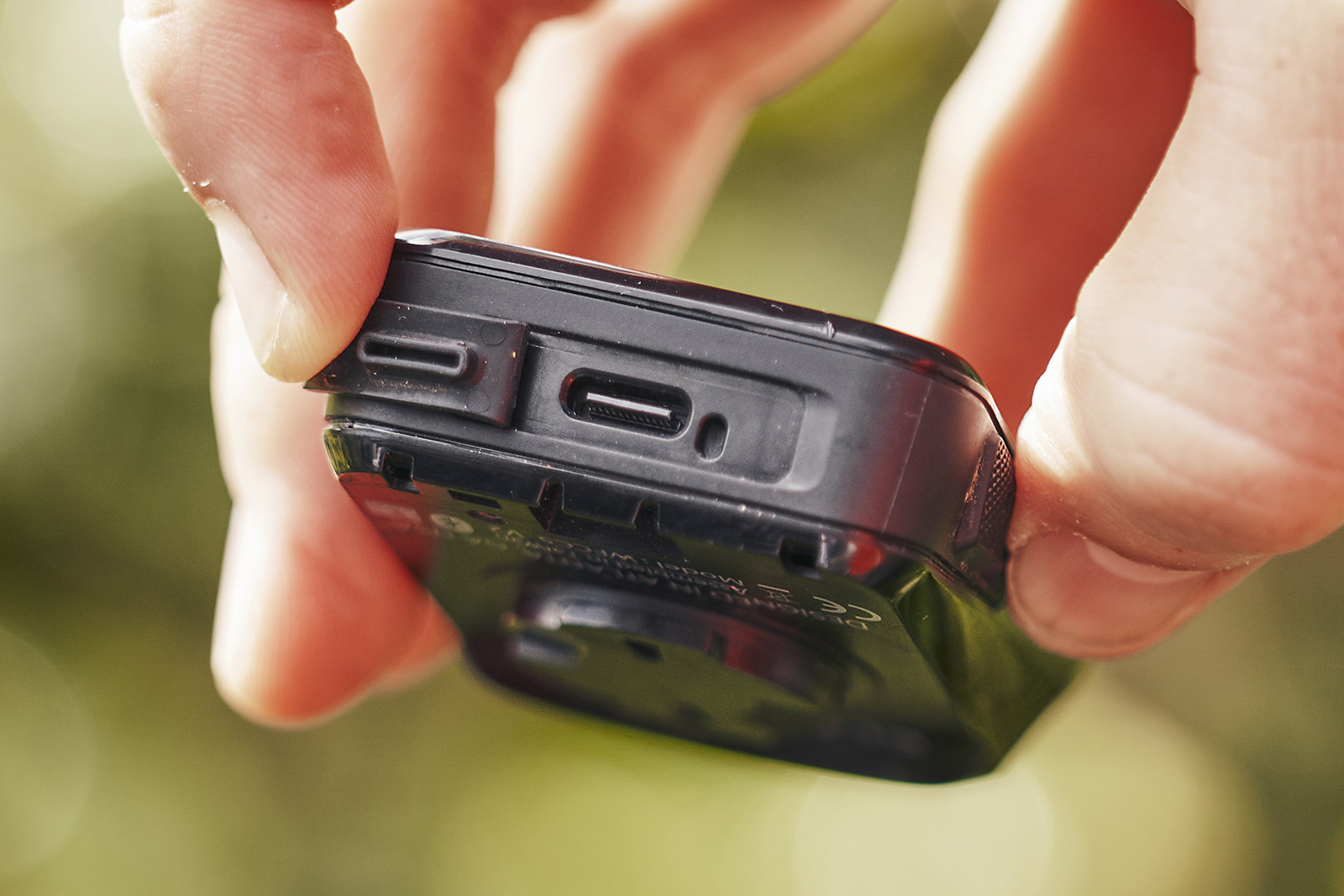All the features of the Wahoo Elemnt bike computers head-to-head
The Wahoo Elemnt Roam and Elemnt Bolt cycling computers offer much of the same functionality in different-sized packages. While the Wahoo Elemnt Roam can be classified as mid-sized, the Wahoo Elemnt Bolt is more compact.
Both are used extensively by pro cyclists, with sponsored teams including EF Education, Lidl-Trek, UAE Team Emirates, Cofidis and DSM-Firmenich PostNL.
Although, on the surface, the functionality offered by the Elemnt Roam and Elemnt Bolt is similar, look deeper and there are subtle differences.
Here, we’ll highlight those differences; you can read more detailed impressions of both Wahoo cycling computers in our in-depth reviews of the Wahoo Elemnt Bolt and Wahoo Elemnt Roam.
Wahoo Elemnt Bolt vs Roam: history
Both the Wahoo Elemnt Bolt and Wahoo Elemnt Roam have had major updates since their initial launches, in 2017 and 2019 respectively.
V2 of the Wahoo Elemnt Bolt was introduced in 2021, replacing the monochrome screen with a 64-colour one, adding full mapping instead of breadcrumbs and swapping to USB-C charging. There was a slight case-size increase and extra storage was added.
The Wahoo Elemnt Roam V2 was introduced in 2022, with updates including extra memory, a 64-colour display and dual-band GPS, although the unit remained the same size.
Wahoo Elemnt Bolt vs Roam: key specs compared

A lot is the same between the Bolt and Roam, but below are the key differences between the two Wahoo Elemnt bike computers.
We’ll assume you’re not too fussed about the Roam being able to lock into SBAS and NavIC, as well as GPS, Glonass, Beidou Galileo and QZSS. You’re not going to get lost for lack of a satellite constellation unless you ride into a cave or a deep lake.
| Elemnt Bolt | Elemnt Roam | |
|---|---|---|
| Size | 77x47x21mm | 90.5×59.5×20.5mm |
| Weight | 68g | 93.5g |
| Screen size | 2.2″ | 2.7″ |
| Display pixels | 240×320 | 240×400 |
| LEDs | 1 array | 2 arrays |
| Memory | 16GB | 32GB |
| Battery life | 15 hours | Up to 17 hours |
| GPS | Single-band | Dual-band |
| Barometric altimeter | Y | Y |
| Accelometer, gyroscope, compass | N | Y |
| Price UK | £249.99 | £349.99 |
| Price US | $279.99 | $399.99 |
| Price Euro | €279.99 | €399.99 |
Wahoo Elemnt Bolt vs Roam: display

The Wahoo Elemnt Roam has a 2.7-inch screen with 240×400 pixels, while the Elemnt Bolt’s screen is 2.2-inch diagonal with 240×320 pixels. Neither is a touchscreen.
Both leave quite a lot of room in the case around the display (the bezel). Some of this is taken up by the three buttons on the lower face of the unit, while more case space is filled by an array of LEDs.
The Bolt has a single set of six LEDs above the display, while the Roam has five LEDs above the display and a further seven down its left side. These can be programmed to add a visual cue for data such as heart rate, without having to read the numbers on the screen – and also to indicate turn direction when navigating.
The LEDs can light up in different colours too: red, green, blue, yellow or white, adding more differentiation to the data displayed.
With version 2 of both the Bolt and Roam, Wahoo has increased the screen display to 64 colours, although neither could be described as vivid. Wahoo says that’s intentional, with colours used to highlight key stats such as heart rate and power zones, while other data is displayed in monochrome, so the important information isn’t drowned out by the other fields as you ride.
The map screen uses colours more to help highlight features, including woods and major roads.
Wahoo Elemnt Bolt vs Roam: size and weight

The Wahoo Elemnt Roam has a mid-sized case, comparable in size to the Garmin Edge 540/840. Its dimensions are 90.5×59.5×20.5mm and the unit weighs 93.5g. The Elemnt Bolt is smaller at 77x47x21mm, weighing 68g.
Both units are supplied with a neatly integrated plastic out-front mount, which Wahoo claims is more streamlined than the standard quarter-turn mount. There’s also a stem-top mount in the box. Wahoo’s mounts are not compatible with Garmin’s.
Wahoo Elemnt Bolt vs Roam: connectivity

The Roam and Bolt differ in their GPS reception. While both can use the GPS, Glonass, Beidou, Galileo and QZSS constellations, the Roam adds SBAS and NavIC to this. It also has dual-band GPS reception compared to the Bolt’s single-band.
Dual-band GPS is claimed to increase position accuracy, particularly under tree cover or between tall buildings.
While both units have a barometric altimeter, to provide more accurate elevation and rate of climb data, only the Roam adds an accelerometer, gyroscope and compass, which enable it to use dead reckoning to supplement its GPS fix.
Both the Roam and Bolt connect to other devices using BLE or ANT+, both work with the Wahoo Elemnt app on Android and iPhones, and both have built-in WiFi for downloads over the internet.
Both will show vehicle proximity when used with a rear-view radar and can display electronic groupset data from Shimano, SRAM and Campagnolo.
Wahoo Elemnt Bolt vs Roam: features

As you’d expect, the Wahoo Elemnt Roam and Elemnt Bolt share many of their features. That starts with close connectivity to the Wahoo Elemnt companion app, which can be used for the initial setup.
The app then provides functionality to add and configure data pages and choose alert sounds, set the data displayed by the LEDs and more. You can also manage linked sensors and WiFi network access, maps and other functionality. Changes made in the app are reflected immediately in the cycling computer when it’s connected.

Both the Element Roam and Bolt now provide gradient profiles for hills on a planned route and for those encountered when riding without navigation. Both also support Strava Live segments.
Both the Bolt and Roam incorporate Wahoo’s Perfect Zoom function. Using the smartphone app, you choose the fields you want to display and their order of importance to you. When riding, you can use the buttons on the side of the case to choose to display fewer fields in a larger font or more fields in a smaller font.
Perfect Zoom is an easy way to focus on your key data when riding hard. It also works on the map screen to change the scale to see more or less of the map. It can be easier to use when riding than trying to pinch on a touchscreen.

Wahoo has increased connectivity for both the Elemnt computers, so you can now control a GoPro, lights with ANT+ connectivity and music while riding.
If you’re carrying your phone when riding, both computers can provide live tracking, group rides, public route sharing (for quick transfer of routes between users) and crash alerts. They will also show alerts for phone messages, incoming calls and emails.
You can use both computers to control smart trainers too, if you want to use them for indoor training.
It’s worth noting that while the Wahoo Elemnt Roam’s 32GB of memory means you can keep a continent’s worth of maps on-device, the 16GB memory of the Elemnt Bolt may mean you need to manage maps more actively, deleting some to make way for new ones if you travel somewhere new to ride.
The Roam comes pre-loaded with maps of a good chunk of the world, including Europe, North and South America, Australia, New Zealand, Japan, South Korea and the UAE; principal exclusions are continental Asia, Africa and Antarctica.
The Bolt is more constrained and includes Western Europe, North America and Australia. In both cases, free maps are downloadable if you want to ride somewhere more exotic.
Wahoo Elemnt Bolt vs Roam: battery life

The Elemnt Roam’s larger size is supported by a longer battery life than the Elemnt Bolt. While Wahoo says the Roam will run for up to 17 hours on a full charge, the Bolt has a 15-hour claimed battery life.
That’s towards the lower end of competing products’ runtimes, with Garmin quoting 26 hours or more for the Edge 540 and 840. The latest update to the Hammerhead Karoo has seen that unit’s battery life extended significantly too, and it’s now claimed to be more than 15 hours, in contrast to the previous-generation Karoo 2’s eight hours or so.
Both Wahoo computers have USB-C charging.
Wahoo Elemnt Bolt vs Roam: operating conditions

Both Wahoo computers are IPX7 waterproof-rated, meaning they can be immersed in water up to one-metre deep for up to 30 minutes without water ingress.
One curiosity is that, while the Wahoo Elemnt Bolt is rated for temperatures up to 50ºC, the Roam is said to handle temperatures up to 70ºC. Both are rated down to -20ºC.
Wahoo Elemnt Bolt vs Roam: price
The Wahoo Elemnt Bolt V2 is currently priced at £249.99 / $279.99 / €279.99. You’ll pay £100, $120 or €120 more for the Elemnt Roam V2, which is priced at £349.99 / $399.99 / €399.99.
Both computers can also be bought bundled with a Wahoo Tickr heart rate monitor, an RPM speed sensor and an RPM cadence sensor. The price for the Bolt V2 bundle is £329.99 / $379.99 / €379.99 and for the Roam V2 bundle it's £419.99 / $499.99 / €499.99.
Wahoo Elemnt Bolt vs Roam: which should you choose?

In terms of functionality, there’s little to choose between the Bolt and Roam, but for the majority of riders, we’d suggest the Roam is a better choice, if the price differential doesn’t sway your decision.
Its larger display is easier to read and its buttons larger. It has more memory, so you don’t need to worry so much about managing maps if you travel abroad to ride and you can store more ride data on-device. The dual-band GPS may give you a slightly better GPS fix and you get more in-built sensors and better battery life.
If you’re into racing, on the other hand, the Bolt may work better for you. It’s more compact, lighter and potentially more aero. You can compensate for the smaller screen by choosing to display fewer data fields, or use Wahoo’s Perfect Zoom functionality (which is also a feature of the Roam) to choose during your ride to display fewer fields.
Both the Wahoo Elemnt Bolt and Roam are great choices though, if you’re looking for a quality GPS cycling computer that’s easy to use and provides a state-of-the-art data interface and seamless coupling to your smartphone.